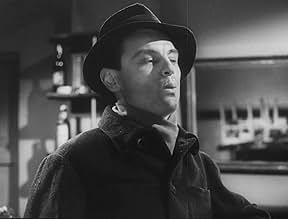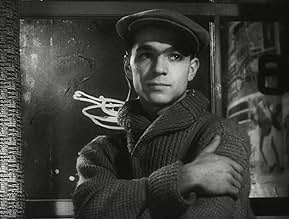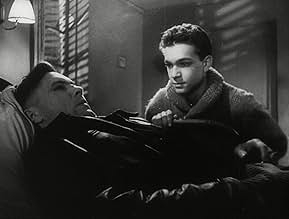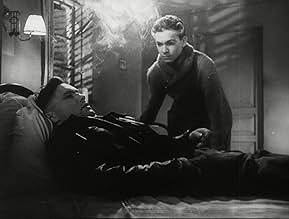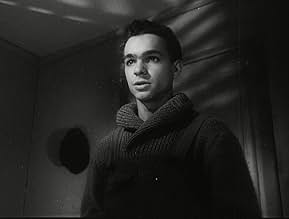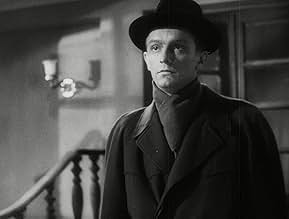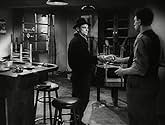AVALIAÇÃO DA IMDb
6,5/10
3,9 mil
SUA AVALIAÇÃO
Adicionar um enredo no seu idiomaTwo men besiege a lunch bar looking for a third man they must kill.Two men besiege a lunch bar looking for a third man they must kill.Two men besiege a lunch bar looking for a third man they must kill.
- Direção
- Roteiristas
- Elenco e equipe completos
- Produção, bilheteria e muito mais no IMDbPro
Enredo
Você sabia?
- CuriosidadesAll the roles were played by students of the VGIK. Moreover, props were not only brought by students from their homes, but also provided from friends and relatives.
- ConexõesFeatured in Une journée d'Andrei Arsenevitch (1987)
- Trilhas sonorasLullaby of Birdland
Written by George Shearing
(1952)
Whistled by the second bar patron played by Andrei Tarkovsky
Avaliação em destaque
Although I did like the 1946 adaptation of the Killers, I wasn't sure how a Russian, let alone someone who is usually much more into the visual prowess of things like Andrei Tarkovsky, would tackle Ernest Hemingway's brief, pulpy story of men on a mission and a man in hiding from those men. Turns out it's one of the best short films I've seen from a soon-to-be world renown European auteur, because of it's emphasis on the simplicity of suspense, of human action in desperate circumstances and how it's filmed with a mix of the noir style and with Tarkovsky's dependence on figures in curiously exciting compositions. He isn't alone on the film, however, as the middle scene at the apartment was directed by friend Alexander Gordon, with Tarkovsky directing the bigger chunks at the diner, and another guy Marika Beiku co-directing overall. Since the apartment scene is so short though, and accounts for just three shots, one being most elaborate as it goes in and out, tight and wide, on the morose Swede in hiding and his friend at the diner filling him in on what happened, it's mostly Tarkovsky's game here.
Part of the skill, and curiosity, in how tense the long first scene at the diner is that music is completely absent, with the only tone coming from Tarkovsky himself as a whistling customer. Meanwhile, Tarkovsky uses Hemingway's dialog in a very realistic manner, even when he goes deliberate angles, like when George goes into the back with the sandwiches and we see his feet in the same tilted frame as an empty can on the floor, or with the usage of the mirror on the wall. There's also the suddenness of seeing a machine gun that strikes things up in the room, and just the general attitude of Al and Max, the hit men, as they keep calling George "bright boy" in a way that reminds me of the curious double-talk in a self-consciously bad-ass movie like Pulp Fiction (not to mention the near casual usage of the 'N' bomb). While it ends sort of on a screeching halt, the sense of ambiguity as to the fate of the Swede as well as everyone else in the diner who hid the secret is worthwhile for the material, as it's perfectly anti-climactic. It's not entirely a simple experiment, as it's too polished for that, but I couldn't see how it could be made any longer either. It's perfectly paced and acted nearly as well, and it's a fitting pre-cursor to the un-prolific but remarkable career of one of Russia's most important filmmakers.
Part of the skill, and curiosity, in how tense the long first scene at the diner is that music is completely absent, with the only tone coming from Tarkovsky himself as a whistling customer. Meanwhile, Tarkovsky uses Hemingway's dialog in a very realistic manner, even when he goes deliberate angles, like when George goes into the back with the sandwiches and we see his feet in the same tilted frame as an empty can on the floor, or with the usage of the mirror on the wall. There's also the suddenness of seeing a machine gun that strikes things up in the room, and just the general attitude of Al and Max, the hit men, as they keep calling George "bright boy" in a way that reminds me of the curious double-talk in a self-consciously bad-ass movie like Pulp Fiction (not to mention the near casual usage of the 'N' bomb). While it ends sort of on a screeching halt, the sense of ambiguity as to the fate of the Swede as well as everyone else in the diner who hid the secret is worthwhile for the material, as it's perfectly anti-climactic. It's not entirely a simple experiment, as it's too polished for that, but I couldn't see how it could be made any longer either. It's perfectly paced and acted nearly as well, and it's a fitting pre-cursor to the un-prolific but remarkable career of one of Russia's most important filmmakers.
- Quinoa1984
- 14 de mar. de 2007
- Link permanente
Principais escolhas
Faça login para avaliar e ver a lista de recomendações personalizadas
Detalhes
- Tempo de duração19 minutos
- Cor
- Mixagem de som
- Proporção
- 1.37 : 1
Contribua para esta página
Sugerir uma alteração ou adicionar conteúdo ausente

Principal brecha
By what name was Os Assassinos (1956) officially released in India in English?
Responda
